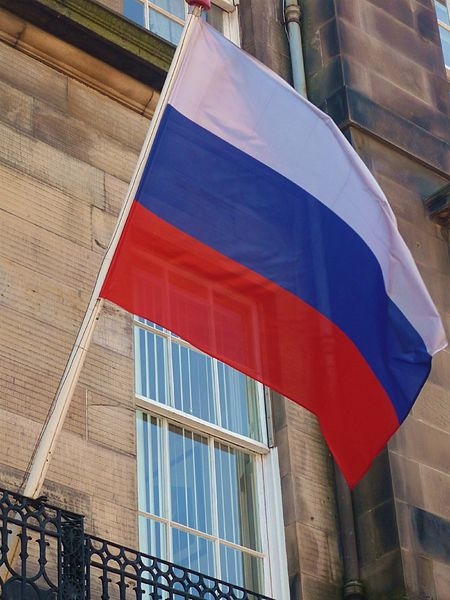You have /5 articles left.
Sign up for a free account or log in.

Wikipedia
With Russia’s annexation of Crimea, U.S.-Russian relations are at their lowest point in decades. Consequently, after two decades on the sidelines, America’s senior experts on Russia — many of whom came of age during the Cold War — are suddenly in demand again. They are sounding alarms not only about Kremlin aggression, but also the lack of young Russia experts who’ll take their places once they retire.
“It is certainly harder for the White House, State Department and intelligence community to find up-and-coming regional experts,” admitted Strobe Talbott, President Clinton’s top Russia adviser and head of the Brookings Institution. “It’s a shorter bench,” said Stanford University Professor Michael McFaul — who recently returned from serving as America’s ambassador to Russia. “The expertise with the government is not as robust as it was 20 or 30 years ago, and the same in the academy.”
In explaining "Why America Doesn't Understand Putin," a Georgetown University professor, Angela Stent, faults foundations’ declining funding of area-studies research and academe itself. “Instead of embracing a deep understanding of the culture and history of Russia and its neighbors, political science has been taken over by number-crunching and abstract models that bear little relationship to real-world politics and foreign policy. Only a very brave or dedicated doctoral student would today become a Russia expert if she or he wants to find academic employment.”
As one of only a small number of junior (i.e., “assistant”) professors in political science departments across the country who specialize in Russia, I am in a unique position to give an insider’s assessment of just how dire the situation has become.
By the time I began to study Russian politics, language, and culture in college, it was 1993 and the Soviet Union had already collapsed peacefully. I enrolled as an undergraduate at the University of Northern Iowa, partly for its robust and well-funded Russian program, which regularly sent students to the intensive, summerlong Russian Language Institute at Bryn Mawr College — twice, in my case. Thanks to these programs, I already had five years worth of college-level Russian language instruction under my belt before I even stepped on to Russian soil. Between 1996 and 1998, I’d spent more than a year living, exploring, and studying Russia at Moscow State University. Unforgettable experiences from meeting Mikhail Gorbachev and ultranationalist Vladimir Zhirinovsky, to getting a public dressing-down from Communist Party head Gennady Zyuganov on the eve of the roisterous 1996 presidential elections only furthered my passion for Russian politics.
As a student, I never asked where money for these programs came from, but as it turns out they were federally funded Title VIII programs for foreign language training. I later learned that — desperate to justify their existence amid flagging interest after the Cold War — these programs needed our numbers to show continued student demand just as much as we needed the funding they provided.
After graduating from Northern Iowa, I enrolled in the master’s program in Russian and East-European Studies at Georgetown University, one of the 17 Title VI Comprehensive National Resource Centers for Russia and East Central Europe dedicated to intensive scholarship and language study of the former Soviet Union. The depth of scholarship was incredible: entire courses dedicated to understanding webs of post-Soviet barter transactions, or the domestic politics of Central Asian autocracies or the ecological devastation left by state socialism — all taught by the top experts in the field. While I decided to continue my education with a Ph.D. program in political science at the University of Wisconsin at Madison (home to another Title VI center), much of my research interest on the political challenges of Russia’s health and demographic maladies — the cornerstone to my recent Vodka Politics book — began with the experts at Georgetown over a decade ago.
Armed with similar Russian expertise, most of my Georgetown colleagues went to work for the government or the private sector. But by choosing to get a Ph.D. instead, my career path lay in academe, where professional success is defined by whether — after six years of nonstop studying, researching and teaching — you land a tenure-track professorship that pays $60,000 a year -- if that.
As grad students, we knew that there were fewer jobs for Russia specialists than for those studying “hotter” regions such as China or the Middle East, but we warmed ourselves with the plausible, yet ultimately unfounded, belief that the entire generation of Sovietologists hired in the ‘70s would be reaching retirement age just as we’d be hitting the market. Still, no self-respecting political science program trains students as just an expert on a particular country or region: your regional focus always takes a back seat to your concentration, often within the subfields of international relations or comparative politics. So, no one on the job market says “I’m an expert on Russian politics.” More likely they’ll say “I’m an expert on nationalism, social movements and revolutions in the context of the former Soviet Union.”
In that regard, I thought my dissertation — examining how the ideas of international activists are filtered through national policy-making institutions by comparing how temperance activism influenced alcohol prohibition in Russia, Sweden, and the United States — was perfect. Not only did I maintain my passion for Russian politics and history, but also developed marketable expertise in a broad range of subfields of international relations and comparative politics. Add to that a few minor publications, a raft of teaching experience and a dash of naive overconfidence, I hit the market.
For those not familiar with it, the academic job market — especially in political science — is a byzantine system. In the summertime, colleges and universities post listings for positions for the following academic year that will round out their departments’ particular teaching needs and research profile. In the fall, search committees winnow through hundreds of applicants to narrow their search down to three, who then get the pleasure of a campus visit. By “pleasure,” I mean an exhausting three days of nonstop interviews, teaching, and research presentations, with no guarantee that the committee won’t fail to be impressed with any of the candidates and just decide not to hire anyone at all. In the spring, a few one-year “visiting” or “adjunct” positions appear, as departments desperately scramble to fill the teaching holes in their schedules, and out-of-luck applicants desperately scramble to fill the holes in their tattered career dreams. Those who don’t land a postdoc or one of these temporary teaching positions have to figure out something else to do until the process starts all over again the following year. Many exemplary — though unlucky — scholars simply drop out.
The spreadsheet on my computer where I’ve chronicled my job market experience is labeled simply “failure.” According to it, in my first foray onto the market in the fall of 2006, I applied to 59 listings for tenure-track jobs in the various topics of international relations and comparative politics that I could reasonably justify some degree of expertise. Of those 59 positions, only two were explicitly looking for experts in the politics of Russia or the former Soviet states: the University of Kansas (another Title VI National Resource Center for Russia), and the University of Wisconsin at Whitewater. Of these two — two — Russia jobs across the entire country (and Canada), both wanted experts on security or terrorism in the region. Neither gave me a call.
The only place that did call was the University of Illinois at Urbana-Champaign, which in the spring offered me a one-year “visiting” assistant professorship, which I eagerly accepted as an opportunity to expand my teaching portfolio, turn my dissertation into a book manuscript, and prepare to give the market another go.
The following year (2007-8), I embarked on the market once again, this time armed with undergraduate teaching awards from the popular courses I’d developed on the politics of the former Soviet states and Russian foreign policy. I’d also landed a contract from a Oxford University Press to publish my revised dissertation as The Political Power of Bad Ideas -- a golden ticket to a job, or so I thought. I applied for 67 assistant professor positions, 11 visiting positions, 5 postdocs and 3 non-academic positions — an untold number of which were withdrawn as the global financial crisis smashed state budgets and university endowments invested in the stock market. Still, of those 81 listings, only one was explicitly looking for an expert on Russia: the University of Washington — yet another Title VI center. Like every other place I applied, they didn’t call me (though it is worth noting that the scholar that they did hire, Scott Radnitz, has been quite busy publicly contributing insights into the current crisis). Thankfully, even as hiring freezes and furloughs loomed, somehow the Illinois political science department found a way to keep me on for another year.
The great recession saw far fewer academic jobs advertised in year three (2008-9): I applied to 51 assistant professor positions, as well as 8 visiting gigs. The number of departments searching for an expert in Russian politics was one: Villanova University. I obsessed over the ad: a broadly trained expert able to offer a wide variety of courses while maintaining a specialty in Russian politics and foreign policy, at a university that puts a premium on both teaching and scholarship? It seemed too good to be true.
As it turns out, it was: like so many job listings at the time, the search was canceled amid the persistent financial uncertainty. Still, I was encouraged that finally, after three full years, my phone actually rang with a campus interview. But that department wasn’t interested in Russia. It was far more interested in my (now extensive) teaching portfolio in international relations, and my research into transnational activism and comparative public policy. In the ensuing battery of interviews, we barely ever talked about Russia. That department passed. Thankfully — largely thanks to another raft of positive student evaluations and teaching awards, Illinois extended me for another year.
No less difficult than years of professional uncertainty are the accompanying personal struggles: nagging doubts about your career choice, your self-worth, and moments of deep depression, which are only amplified as the sole breadwinner for a family that had grown to five. My wife and I decided that if year four didn’t land me a tenure-track position, we’d close up shop on the academic career — no regrets. Still, I lamented abandoning the academy without ever writing the book about the politics of alcohol and demography in Russia that had motivated my research from the beginning. So, armed with a prospectus and a draft chapter, I shopped the Vodka Politics project around the Midwest Political Science Association conference in Chicago, and left with interest from a half-dozen academic and commercial publishers. With a second book contract in hand, I had a C.V. that would merit tenure at many colleges, yet given the near-complete lack of openings for Russian scholars, I still couldn’t find a job.
In year four (2009-10), I applied for 91 assistant professor positions, 6 postdocs, and 8 non-academic jobs. Of them, there was again only one specifically looking for a Russian-politics expert: my dream job at Villanova had been re-listed. Finally, in year four — having developed seven unique course offerings, and having taught them 25 times — did I start getting interest from search committees, including interviews at Johns Hopkins, Wyoming, and — yes — Villanova. The only offer — thankfully — was the Villanova position that I still consider my “dream job,” which I took without hesitation.
From 2006 through 2010, I spent four years on the academic job market, mailed 309 job applications, landed four campus interviews and one job offer. They say about hitting in baseball, that if you fail 7 out of 10 times (.300), you’re a success. That’s little consolation when you’re batting .013 in job interviews on the market, and .003 in actual job offers. Even within political science, many recognize that employment prospects for regional experts are bad — though I doubt any realize just how bad they are.
Whether my tale is one of tenacity or stupidity is certainly up for debate. Still, it suggests that the present lack of junior Russia scholars in academia is attributable more to the near-complete absence of academic employment opportunities than a lack of qualified scholars. If anything, the situation is even worse outside of political science, with few jobs for historians and scholars leaving the field. These are losses not only to academia, but potentially to our collective understanding of future political developments in Eurasia, at a time when such expertise is needed more than ever.
As in the past, when U.S.-Russian relations run cold, employment opportunities for experts on Russia should expand. Unfortunately however, thanks to government austerity measures and cutbacks in higher education, there will be far fewer qualified experts to meet demand.
For instance, the program in Russian/East European Studies that was one of my majors at Northern Iowa does not exist anymore. Moreover — reflecting a national trend in higher education—the Russian language program was liquidated, along with German, French and other programs, leaving a modern languages department that teaches only English and Spanish. What’s more, the long-running study abroad program that ferried me to Russia three times in the 1990s is in dire straits as well. Amid deteriorating relations between the U.S. and Russia just this month, Russia’s Ministry of Justice ordered American Councils — the nonprofit organization that administers numerous professional, research, and study abroad programs throughout the former Soviet Union — to re-register its offices in Russia.
While the Kremlin has dealt this devastating blow to the promotion of East-West scholarship and understanding just recently, Capitol Hill has been undercutting international programs for far longer, with even more damaging results. Russian studies have been particularly victimized by politicians on Capitol Hill. Funding for Title VI National Research Centers — like those where I was trained and where the very few academic jobs on Russia arose — has been under assault by “fiscal conservatives” for the past few years. The prestigious Fulbright-Hays award for dissertation research abroad was canceled in 2011, before a limited reinstatement. In 2013, House Republicans defunded research in political science supported by the National Science Foundation, unless researchers can show that their research will promote American security or economic interests. Finally, in 2013 the federal government cut its Title VIII programs, which had funded my study abroad opportunities, as well as those of America’s top Russia researchers and diplomats.
The lesson is tragic but clear: just when America finds itself in need of new experts and new expertise on Russia and Eurasia, Capitol Hill has effectively castrated most every nonmilitary program that promotes language acquisition, cultural proficiency, and research into the region. This bleak situation is only made worse by the new barriers to international education erected by the Russian side as bilateral relations deteriorate.
If present trends continue, the ability to develop in-depth expertise on the languages, cultures, and politics of the former Soviet Union may soon be limited to heritage speakers with roots in the region, those with a specialized area-studies training in the military, or the narrow stratum of individuals wealthy enough to fund their own language training. For the development of robust expertise into regions that are of strategic national concern — now and for the foreseeable future — none of these are palatable outcomes.




